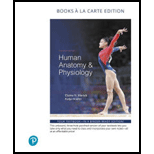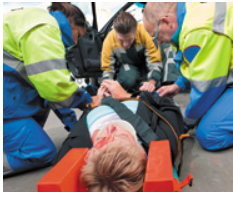
52-Year-Old Male with Multiple Sclerosis
Mr. Ayers was diagnosed with an aggressive form of multiple sclerosis 18 years ago. His illness has not responded to conventional treatments so he's been referred to your clinic for a clinical trial.
The doctor explains that his treatment will involve giving Mr. Ayers a drug that will release stem cells from his bone marrow so they can be collected from his blood. Then Mr. Ayers will be given (1) drugs that will destroy the blood-forming cells in his bone marrow, and (2), antibodies against his T lymphocytes. Finally, the stem cells that were collected from him will be used to repopulate his bone marrow.

The doctor says, “This treatment avoids problems, such as transplant rejection, that are associated with other kinds of transplants.”
2. One reason for using Mr. Ayers's own tissue is that it can be very difficult to find a donor whose bone marrow cells match the patient's class I and II MHC proteins. What is an MHC protein? What is the difference between class I and class II MHC proteins?
Want to see the full answer?
Check out a sample textbook solution
Chapter 21 Solutions
Human Anatomy & Physiology, Books a la Carte Edition (11th Edition)
- Your patient is a 2-year-old male named Justin. He is suffering from hypotonia (decreased muscle tone), weakness and growth failure, and is unable to walk. His mother has just brought him into the emergency room from the family beach house, where they have been spending the summer, because he has had a seizure. X-rays indicate that the toddler is suffering from rickets, which is a result of a nutritional deficiency of Vitamin D. But his mother insists that her son’s diet is not Vitamin D-deficient. He drinks three glasses of milk a day, and his diet also includes meat and eggs. A simplified scheme of Vitamin D metabolism is shown to the left. The chemical name of active Vitamin D is 1α, 25-dihydroxycholecalciferol, and it is synthesized via the pathway shown. Catalysts, both in the form of enzymes and ultraviolet light, are required for Vitamin D synthesis. The two main sources of active Vitamin D are diet and sunlight. Food supplemented with “Vitamin D” usually contains…arrow_forwardBobby has been diagnosed with PKU. His mother wants to know about the treatments. What would you tell her?arrow_forwardWhy is this disease a major threat to individuals with sickle cell anemia?arrow_forward
- 2) Laura felt sick at a party last night after taking 3,4 methylenedioxymethamphetamine (MDMA), otherwise known as “ecstasy”. Despite drinking a lot of water, when she came home and went to sleep, she could not wake up the following morning. Out of concern, her friends brought her to a local hospital for evaluation. The ER doctor ordered a series of blood tests. The results are in the table. a. Write down some of your observations about Laura’s test results. b. MDMA may act as an anti-diuretic. Could this explain Laura’s test results? Why or why not? c. Why is Laura’s condition dangerous to her cells? d. Describe one way you could treat Laura’s condition.arrow_forwardTopic: HeLa Cells and the Ethical Considerations of Medical Research Watch the following video called "Cracking the Code of Life" (https://fod.infobase.com/OnDemandEmbed.aspx?lti=1&token=30037&wID=97629&loid=0&w=400&h=300) and also "Immortal Cells"(https://fod.infobase.com/OnDemandEmbed.aspx?lti=1&token=145475&wID=97629&loid=496678&w=400&h=300 ) then answer the following question with evidence from the film to support the question. Also, here is info from Johns Hopskins on the case : (https://www.hopkinsmedicine.org/henrietta-lacks/importance-of-hela-cells) 1) In one paragraph, in your own opinion, explain what are 3 things youv'e learned about the Henrietta Lacks case that relate to the learning objective? (To apply ethical considerations to understanding consent to use one's genomic material for medical research.) 2) In one paragraph, in your own opinion, explain how do you feel about private corporations making money off patenting parts of…arrow_forwardIf neurons in the central nervous system lack centrioles and are unable to divide, how can a person develop brain cancer?arrow_forward
- Part || – An Unexpected Visitor After Ivy was finished meeting with Dr. Alvarez, she didn't feel like going back to her dorm room where her room- mates were waiting to hear from her. She decided to process her diagnosis at the local coffee shop. Curling up in an oversized chair with a warm cookie and peppermint hot cocoa with whipped cream always made her feel better. Sitting alone would give her time to think. How could something so important go so wrong in her cells? How did cells get or make the mitochondria anyway? Obviously, cells could survive without mitochondria if they had to, so why had mitochondria evolved in the first place? Just then, Ali, a fellow student in her biology class who made it a point to sit near her each class, walked over to strike up a conversation. "Hi Ivy! Whať's up?" Trying to avoid conversation, Ivy simply shrugged and mumbled, “Not much." Ali gave her a big smile and said "I've noticed that you take good notes in bio, would you want to study together...…arrow_forwardWendy Marawi, a 35-year-old cancer patient, recently underwent a bone marrow transplant. During her teleconsultation with her doctor, she complains that she has been experiencing nausea and bowel movement discomfort, and she cannot sleep at night due to fever. The doctor requested the Blood Bank to investigate if there were some errors in the transfusion. a. What is her diagnosis? Explain your answer by correlating with the given laboratory data. b. What are the key symptoms seen in the situation? c. Does she need further workup? What other laboratory tests should be done?arrow_forwardWhat is tumourarrow_forward
- What recent advancements in hematology research have shed light on the role of non-coding RNA molecules in regulating hematopoiesis and hematological disorders?arrow_forwardIf you were an older adult and were suffering from a condition for which there was no cure and very few treatment options, would you want to know about the disease or would you want your doctor and family to keep this information from you? Explain your choice.arrow_forwarda.) what a bone marrow transplant is and how it is done b.) what stem cells are.arrow_forward
 Human Heredity: Principles and Issues (MindTap Co...BiologyISBN:9781305251052Author:Michael CummingsPublisher:Cengage Learning
Human Heredity: Principles and Issues (MindTap Co...BiologyISBN:9781305251052Author:Michael CummingsPublisher:Cengage Learning


